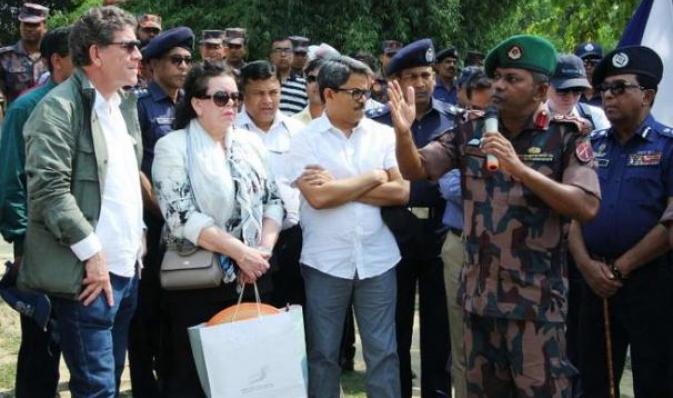
Published by Albawaba on May 6, 2018
The visit of U.N. Security Council envoys to Myanmar has been cautiously welcomed by Rohingya advocates who called for stronger pressure on Myanmar authorities to put an end to genocidal policies against the Muslim minority.
Abdul Malik Mujahid, chairman of Burma Task Force USA, said the visit by the Security Council delegation has been an extraordinary step.
“I hope they also secure the permission from Aung Sang Suu Kyi's government to allow the U.N. investigation team to go there,” Mujahid said, adding that Myanmar authorities had so far blocked independent investigations into mass killings in Rakhine state.
Since Aug. 25, 2017, some 750,000 Rohignya, mostly children and women, fled Myanmar when Myanmar forces launched a crackdown on the minority Muslim community, according to the Amnesty International.
At least 9,000 Rohingya were killed in Rakhine state from Aug. 25 to Sept. 24, according to Doctors Without Borders.
Mujahid, a prominent author and rights advocate for the Rohingya, called on Security Council members to take a strong stance against the violence and atrocities by Myanmar security forces.
“The U.N. Security Council is about passing resolutions, I am still looking for them to pass a resolution [stating] that it is a genocide,” he added.
Mujahid also demanded that those responsible for crimes in Rakhine state should be tried at an international criminal court.
The Security Council envoys met with Myanmar’s de facto leader Aung San Suu Kyi and military chief Min Aung Hlaing on Monday, and later traveled to Rakhine State, months after a brutal crackdown by Myanmar’s security forces.
Mujahid condemned Myanmar's leader and Nobel laureate Suu Kyi for remaining silent to her country's treatment of Rohingya.
“People are living in [a] false dream [by] considering Burma has two governments: one is military, one is civilian,” he said.
“Well if she doesn’t have any power, she should resign. But if she has power, and I believe she does, she can speak that this is a genocide, and 'I will not allow it to happen'
“Instead of that saying that, she says: 'I am a politician, not a human rights activist'. We are not looking for a human rights activist, we are looking for her to be a human being.”
Myanmar human rights activist Dr. Maung Zarni, was also sceptical of the U.N. Security Council’s recent initiative.
“The reason I do not feel hopeful about the U.N. Security Council’s involvement at this point is that they are sticking with the false notion that this is a conflict, and that will take a long time to resolve,” he said.
Zarni argued that the Myanmar military was carrying out a “pre-emptive genocide” campaign against the Rohingya Muslims, out of a fear that they can be used by neighbouring Bangladesh to take land from Myanmar.
“The genocides are not conflicts. Genocides are a one-sided attempt to eradicate a community, ethnic and religious community in the case of Rohingya, by the dominant political state, that is racist,” he said.
He said U.N. Security Council member states had to exert pressure on the Myanmar regime, by adopting a resolution, clearly demanding an end to the killings and persecution of Rohingya.
“As long as U.N. Security Council does not call this crime by its name, which is genocide, they will continue to dodge the real question,” he said.
Pointing out to the failure of Security Council members in the last seven months to agree on a resolution on Myanmar, Zarni said, he was not very optimistic.
“In the case of Burma [Myanmar] and the Rohingya, U.N. Security Council has failed to issue even a single statement, that is why I don’t feel hopeful about the Security Council at all,” he said.
The Rohingya, described by the U.N. as the world's most persecuted people, have faced heightened fears of attack since dozens were killed in communal violence in 2012.
The U.N. has documented mass gang rapes, killings -- including of infants and young children -- brutal beatings, and disappearances committed by security personnel. In a report, U.N. investigators said such violations may have constituted crimes against humanity.
This article has been adapted from its original source.
© Copyright Andolu Ajansi









